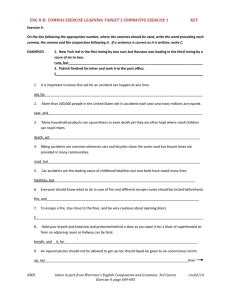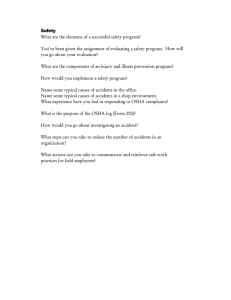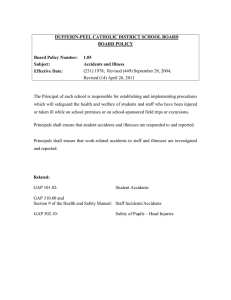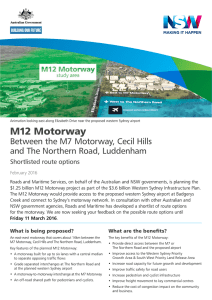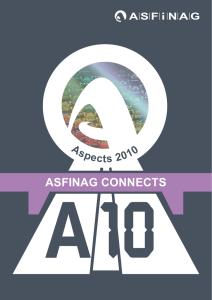Intelligent Transport Systems Infrastructure Views from infrastructure and road operator Jacques Boussuge
advertisement
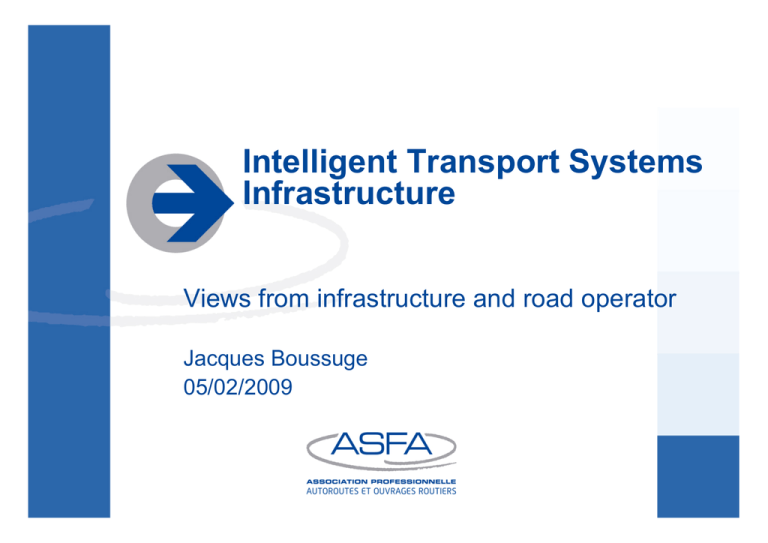
Intelligent Transport Systems Infrastructure Views from infrastructure and road operator Jacques Boussuge 05/02/2009 Toll road network & partners 8500 km network 15 members in ASFA 81 billion km travelled heavy good 16% VL PL 84% In past 15 years: Traffic x 2 Risk of fatalities /4 Light Safety on motorways : key figures Decrease of risk of fatalities by 40% between 2002 et 2007 2007 7,9 10,0 All accidents 19 508 Fatal accidents 8,5 8,0 6,0 173 2,3 4,0 fatalities 197 Injury accidents 1319 Injuries (hospitalized) 1184 20 18 16 14 12 10 8 6 4 2 0 1985 2,0 0,0 Ensemble des Autoroutes (estimations concédé et non concédé) Routes nationales Total Motorway 4 times safer Nombre de tués pour 1 milliard de véh. km ------ Limite du fuseau des variations annuelles dans la tendance de : - 6,5% / an 1987 1989 1991 1993 1995 1997 1999 2001 2003 2005 2007 Safety factors on motorway Linéarité du tracé Interdiction aux piétons et vélos Séparation des voies Surveillance du réseau Échangeurs ITS Équipements Mission of motorway companies ►Acting as Toll infrastructure operator under a concession contract with the Ministry Safety- incident management Traffic management Toll collection ► responsible for performance in safety and mobility: objectives To optimize the infrastructure To face an increase of traffic (+ 30-50%) To face the objective of zero accident( number of fatalities / 2 in next 15 years) To face the objective of zero congestion To face a target reduction of CO2 emission ►sustainable mobility ITS, a tool for this new challenge Existing intelligent technologies used for traffic management Infrastructure data collection (monitoring) Magnetic loops, camera, radars, weather stations,… Traffic Control Centres (processing) Real time information with VMS Electronic Toll collection lanes In car information: radio –RDS TMC Web; mobile phone ►automatic incident detection, speed regulation, lane banning,….. 8300 km covered by an efficient and real time traffic managment system 8200 km of fibre optics 4500 toll lanes 3 000 cameras : 500 km automatic detection management 2500 ETC lanes 510 weather stations 71 traffic control centres including 8 central control centres 40 fixed radars plus mobile ones (Speed control) 8300 km with a real time Traffic information 24/24 1 080 variable messages sign displays – every 15 km in average 8000 km coverage FM 107.7 radio (with traffic information bulletin every 15 min) 8 000 km RDS-TMC service for vehicle nagivation system – update every 3 minutes 2 000 km of travel time information (on network critical streches) Common traffic data based of the motorways companies managed by Autoroutes-trafic available on website More to be implemented With the deployment of : Dynamic speed control Real time incident detection Fret portal Real time information Speed alert Electronic tracking of hazardous goods in tunnel Seamless traffic information (handover) Speed regulation Cross border Traffic management plan … Deployment at European level with EASYWAY DGTREN - phase 1: 2007/09, phase 2: 2010/11, phase 3: 20012/13 21 member states: - Traveller information services - Freight and logistic services - Traffic management services - Supported by monitoring (including data exchange between TCC) + European studies for PanEuropean specifications Cooperative traffic management An improvement of motorway operation to respond to the new challenge ? Generalisation of V2I and I2V communication in real time, and satellite positioning ►V2I: improve data collection (more precise and more rapidly) ►I2Vimprove driver information (more precise more located) ►►extend possibilities of traffic management DGInfso: ROSATTE – COOPERS CVIS - SAFESPOT In car information on speed limits support of speed limit enforcement - Started in SERTI - Carried on with COOPERS and ROSATE projects Information chain Route providers Off board driver Motorway company 1 Speed map on the internet autoroutes.fr Static speed limits Data distribution Off board – pre trip Map makers AutoroutesTrafic Content provider RDS TMC operators On board driver Temporary / dynamic speed limits GPRS DSRC Motorway company n Data acquisition Internet providers Data Merging Data distribution On board – on trip COOPERS - Section 2: on board Emergency call – PSA - ASF Reduction of incident detection time -1 300 injuries accidents -19 000 accidents - 300 000 breakdowns ►15% over accidents in fatalities Emergency call Infrastructure based In car Recueil de données Trafic et météo cameras Postes d'appel d'urgence Gendarmerie Patrouilleurs Traffic Control Centre Preliminary evaluation: 5 minutes earlier in average with in car information Cooperative management benefits increase Road operators possibilities of traffic management by completion of existing intelligent infrastructure: New “Variable Message Signs” in the car New “Emergency boxes” in the car New “Traffic sensors” in the car 3 Factors of success of cooperative traffic management 1- New actors in traffic management (automotive industry, telecom industry, equipment and content providers,…) work with road operators. 2- The business model recognizes the economic value all along the chain of the information production. 3- To give evidence that each driver need on board reliable traffic information and pay for that as he does for tyres, energy or airbag. Thanks for your attention
